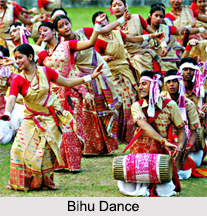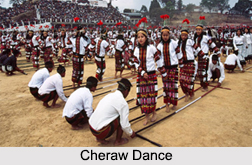 Folk Dances of North East India are mainly focussed on the dances of Arunachal Pradesh, Assam, Meghalaya, Manipur, Mizoram, Nagaland, and Tripura. Dance is the language of freedom of the soul and when it comes to the folk dances, the sky is enormous as the dances are devoid of the intricate grammar akin to the traditional and classical dance forms. Folk Dances of North East India thus unambiguously pinpoint the dance that is the symbol of the natural, unprompted and the spontaneous life of the common people.
Folk Dances of North East India are mainly focussed on the dances of Arunachal Pradesh, Assam, Meghalaya, Manipur, Mizoram, Nagaland, and Tripura. Dance is the language of freedom of the soul and when it comes to the folk dances, the sky is enormous as the dances are devoid of the intricate grammar akin to the traditional and classical dance forms. Folk Dances of North East India thus unambiguously pinpoint the dance that is the symbol of the natural, unprompted and the spontaneous life of the common people.Different Folk Dances of North East India
North East India is known for its interesting culture and eclectic dance forms. Following are the Different Folk Dances of North East India:
Bihu Dance: This is a happy dance that is contributed by men as well as women. The Bihu Dance is a folk dance of Assam which is extremely connected to the festival of Bihu. All dancers dress in the traditional and colourful Assamese clothes that attach charm to the complete dance. The important features of the dance are subtle movements of the hips, wrists, arms along with squats and curves but with no jumps. The dance is executed along with beautiful Bihu Music.
 Zeliang Dance: The members of the ‘Zeliang’ tribe let their women members to take part in dance along with the men. Zeliang is a unique dance form of Nagaland. The members enter the dance stage with some unusual movements that are characterized by the foot beating sounds. Dancers change their beats relatively in this dance and some unusual chants and hand clapping sounds punctuate the whole presentation.
Zeliang Dance: The members of the ‘Zeliang’ tribe let their women members to take part in dance along with the men. Zeliang is a unique dance form of Nagaland. The members enter the dance stage with some unusual movements that are characterized by the foot beating sounds. Dancers change their beats relatively in this dance and some unusual chants and hand clapping sounds punctuate the whole presentation.Hojagiri Dance: The Hojagiri dance is presented by ‘Riang’ clan of Tripura tribes. Only women are permitted to participate in this Puja and there are 5-7 members in each dance team. It is normally performed on the propitious occasion of the Hojagiri Lakshmi Puja.
Pung Chalom Dance: This is a famous Manipuri Dance. This is an exclusive dance that is an introduction to the famous ‘Ras Lila Dance’. Dancers move to the beat of the ‘pungi’ which is a kind of hand operated drum. Acrobatics are performed without breaking the tempo of the dance.
Singhi Chham Dance: Singhi Chham is a type of masked dance presented in Sikkim. This dance centres on the Snow Lion which is the symbol of Sikkim. The Snow Lion is formally identified as the symbol of the state of Sikkim as ordered by spiritual Guru Padamsambhava. This beautiful dance is performed in the month of September and demonstrates a great depiction of Sikimese culture.
For more visit the link given below: